Zum ersten Mal fand die „Conference on Research Data Infrastructure“ vom 12. bis 14. September 2023 in Karlsruhe statt. Die Konferenz wurde vom Verein Nationale Forschungsdateninfrastruktur (NFDI) e.V. in Zusammenarbeit mit dem Karlsruher Institut für Technologie (KIT) organisiert und brachte unter dem Motto „Connecting Communities“ nationale und internationale Expert*innen aus verschiedenen Forschungsbereichen und der Infrastruktur für Forschungsdatenmanagement zusammen. Bei zahlreichen wissenschaftlichen Vorträgen, Diskussionen, Gastvorträgen, Posterpräsentationen und Networking-Gelegenheiten lag der Fokus der Veranstaltung auf der umfassenden Nutzung von Forschungsdaten. Wie Coscine sich in die Konferenz integrierte, erfahren Sie in diesem Blogbeitrag.
Hintergründe
Die Konferenz erstreckte sich über drei Tage und beleuchtete verschiedene Aspekte des Forschungsdatenmanagements (FDM) sowie den gemeinsamen Aufbau einer effizienten Forschungsdateninfrastruktur für Deutschland und darüber hinaus. Ziel war es, ein Bewusstsein dafür zu schaffen, dass Forschungsdaten umfassender genutzt werden, um Erkenntnisse zu erweitern, Innovationen voranzutreiben und den daraus resultierenden gesellschaftlichen Nutzen zu maximieren. Außerdem diente die Konferenz zum persönlichen Austausch untereinander und bot somit beste Möglichkeiten zum Netzwerken.
Coscine – Star der Konferenz
Am 13. September war es dann so weit, dass Coscine im Vormittagsprogramm vorgestellt werden konnte. Bei rund 200 Teilnehmenden stand unsere Kollegin Katja Jansen allen Fragen und Anregungen Rede und Antwort. Inhalte der Präsentation waren u.a. generelle Informationen über Coscine und Coscine.nrw, die Zeitleiste wichtiger Meilensteine und Errungenschaften, die Umsetzung neuer Anforderungen sowie ein Ausblick in die Zukunft von Coscine und Coscine.nrw.
Errungenschaften und Meilensteine
Die Entwicklung von Coscine als Open-Source-Plattform begann im Jahr 2018. Im Jahr 2020 startete dann offiziell die Pilotphase an der RWTH Aachen, begleitet von kontinuierlichen Verbesserungen im Hinblick auf Benutzerfreundlichkeit und das Benutzeroberflächendesign. Zwei Jahre später wurde eine neue Benutzeroberfläche eingeführt und es begann der Onboarding-Prozess für Nutzende ausgewählter Universitäten und Fachhochschulen. Zudem wurde die Plattform Jards für die Review-Prozesse von Speicherplatzanträgen sowie ein Generator für Applikationsprofile (AIMS) implementiert. Seit April 2023 befindet sich Coscine im Regelbetrieb, und es werden Persistent Identifiers (PIDs) nicht nur für Ressourcen, sondern auch für Projekte vergeben. Ab dem Jahr 2024 sind neue Funktionen geplant, darunter Verbesserungen auf Basis von Community-Feedback. Außerdem werden Coscine.nrw und DataStorage.nrw eingeführt, um die Plattform auf Landesebene weiter auszubauen.
- Quelle: Nationale Forschungsdateninfrastruktur
- Quelle: Eigene Darstellung
- Quelle: EIgene Darstellung
Coscine.nrw
Coscine.nrw ist ein Projekt, das für alle Universitäten und Hochschulen im Verbund der DH.nrw angeboten wird. Darunter zählen 42 Universitäten und das Ministerium für Kultur und Wissenschaft des Landes Nordrhein-Westfalen. Dieses Projekt basiert auf einem Open-Source-GitLab-Repository, das als gemeinsame Plattform für die Zusammenarbeit und Entwicklung dieser Software dient.
Ein zentrales Element von Coscine.nrw wird die Möglichkeit sein, Issues zu erstellen. Dies soll den Nutzenden ermöglichen, Probleme, Anforderungen oder Ideen zu dokumentieren und in einem strukturierten Rahmen zu diskutieren. Dadurch wird die Kommunikation und Zusammenarbeit zwischen den verschiedenen Universitäten und Hochschulen des DH.nrw-Verbunds erleichtert. Diese Issues sollen für vielfältige Zwecke genutzt werden können, von der Fehlerverfolgung bis zur Planung neuer Funktionen und Verbesserungen.
Ein weiteres wichtiges Konzept in Coscine.nrw ist die Verwendung von Epics zur Organisation und Verfolgung von umfangreichen Anforderungen. Epics sind Sammlungen von Issues, die ein gemeinsames Ziel oder eine größere Initiative repräsentieren. Dies wird es den Universitäten und Hochschulen ermöglichen, komplexe Projekte besser zu strukturieren und den Fortschritt auf höherer Ebene zu verfolgen.
Die Nutzung von Coscine.nrw soll in Zukunft den Mitgliedern des DH.nrw-Verbunds die Möglichkeit bieten, ihre Anforderungen und Ideen in einem offenen und transparenten Rahmen einzubringen. Durch die gemeinsame Nutzung eines GitLab-Projekts können sie Ressourcen und Know-how bündeln, um die Software kontinuierlich zu verbessern und den Bedürfnissen der Bildungseinrichtungen gerecht zu werden.
Ausblick
Coscine wird kontinuierlich weiterentwickelt, um Forschenden das bestmögliche Forschungsdatenmanagement bieten zu können. Aktuell wird an verschiedenen Features gearbeitet, die zur Optimierung der Plattform beitragen. So wird voraussichtlich Ende September / Anfang Oktober 2023 eine neue Version der API eingeführt. Diese Aktualisierung wird die Funktionalität der Plattform weiter verbessern. Außerdem wird in Zukunft angestrebt, alle Hochschulen und Fachhochschulen von DH.nrw in Nordrhein-Westfalen in das Coscine-Netzwerk einzubinden. Hierbei sind Verträge und technische Anforderungen von Bedeutung, um eine nahtlose Integration zu gewährleisten. Gleichzeitig wird auf die kontinuierliche Verbesserung der Plattform durch die Community gesetzt, wobei der SAFe-Prozess (Scaled Agile Framework) und GitLab als Werkzeuge für die Zusammenarbeit dienen. Die geplante Einführung von DataStorage.nrw soll allen Hochschulen und Fachhochschulen in Nordrhein-Westfalen die Nutzung ermöglichen. Diese Erweiterung wird voraussichtlich ab Ende 2024 verfügbar sein. Seit Juli 2023 steht eine eigene Jards-Instanz zur Verfügung, die es zukünftig ermöglicht, unabhängige Bewertungen von Speicheranwendungen durchzuführen. Darüber hinaus soll Coscine die Möglichkeit zur Nutzung von Cloud-Speicher und Sciebo bieten, um Forschungsdaten effizient zu speichern. Die Verwendung von elektronischen Laborbüchern wie eLabFTW wird zukünftig die elektronische Dokumentation von Laborarbeiten und Experimenten ermöglichen. Ein weiterer Ausblick ist die Förderung des Austauschs und der Zusammenarbeit mit anderen Hochschulen und Datenverantwortlichen. Dies dient dazu, Feedback zu sammeln und gemeinsam Lösungen für auftretende Probleme zu finden.
Fazit
Die „Conference on Research Data Infrastructure“ in Karlsruhe markierte einen bedeutenden Schritt zur Förderung der Forschungsdateninfrastruktur in Deutschland. Wir schätzen die Gelegenheit, Coscine vorstellen zu können und wertvolle Gespräche mit einer Vielzahl von Akteur*innen geführt zu haben. Ihr wertvolles Feedback begleitet uns auf unserer Heimreise und wird in unsere Arbeit einfließen.
Mehr erfahren
Sie möchten keine News über Coscine mehr verpassen? Dann abonnieren Sie unsere Mailingliste und besuchen Sie uns auf unserer Webseite.
Sie haben Fragen oder Feedback? Dann schreiben Sie eine Nachricht an das IT-ServiceDesk. Wir freuen uns auf Ihre Nachricht!
Verantwortlich für die Inhalte dieses Beitrags ist Arlinda Ujkani.


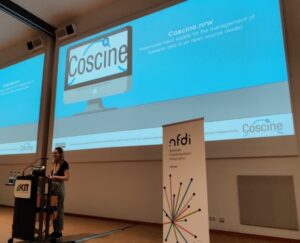
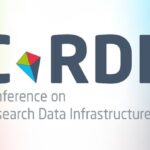
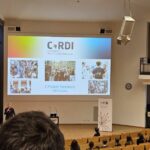
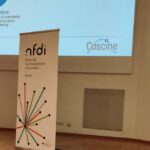


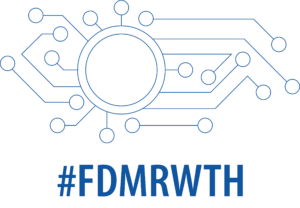
Schreibe einen Kommentar
Du musst angemeldet sein, um einen Kommentar abzugeben.